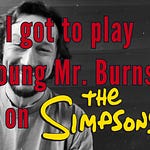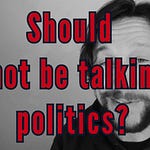Here’s my favorite anecdote from getting to work with Aaron Sorkin who wrote and directed a movie I was in called The Trial of the Chicago 7. If you haven’t watched his stuff, suffice to say, it tends to clip along at a healthy pace.
We sat down to rehearse a 6-page scene of dense dialogue. 6 pages is a relatively long scene for a contemporary movie. Especially 6 pages of four guys just sitting in an office, talking. Now, the scene was chock-full of necessary information, so it couldn’t have been much shorter. But if we wanted to keep the audience interested, we had to burn through it.
And so, Aaron started our rehearsal that morning with a story about how he witnessed the legendary director Mike Nichols encourage his actors to keep the pace up with this exceedingly blunt rule: “Start speaking as soon as it’s your turn, and don’t stop speaking until your turn is over.”
This piece of direction is a dryly hilarious and deeply shrewd commentary on the entire art and craft of acting, and explaining why would take a whole essay of its own. But basically he was saying: no dramatic pauses allowed. The truth is that a lot of the pauses actors take are nothing more than covert attempts to hide the fact that we haven’t properly learned our lines. Either that, or we just can’t help wanting the camera to stay on us just a bit longer. Of course, Mr. Nichols couldn’t have meant what he said with the absolutism he was feigning. A well-timed dramatic pause can often communicate more than words ever could. So I think what Aaron meant was this: If you’re going to take a pause, make sure you do it on purpose.
I think there’s a worthwhile analogy here between taking a dramatic pause in a scene of dialogue, and taking a moment of time in our lives to “do nothing.” It’s the value of silence. Stillness. Negative space.
Doing nothing is hard for me. I’m a workaholic at heart (though I’ve gotten better since becoming a dad). I’m often anxious that I could be doing more, or perhaps that I won’t have done enough by the time I die. It keeps me up at night, not wanting to surrender the day. It makes it hard for me to sit in sincere stillness.
But a life with no moments for doing nothing is like a movie with no dramatic pauses. It gets to be too much all at once. One line bleeds into the next, just like one day bleeds into the next. Soon a whole scene has gone by, or a whole week, without any clear moments of emphasis. And when the credits roll, nothing outstanding comes to mind. Not what I want for my death bed.
Our culture today doesn’t offer much reward to those who excel at doing nothing. You don’t get money. You don’t get likes. On the contrary, we tend to reward the workaholics and the attention hogs. But there is a popular backlash against this “always-on” attitude, stemming back to the Bohemians and then the Hippies, and continuing nowadays with trends like Self-Care and Quiet Quitting. We have a collective hunch, I think, that there’s something important about taking time to do nothing.
However, just like Aaron was advising us actors to be very intentional about when and how to take a dramatic pause, I think we all need to be very intentional about when and how we take time out of our lives to do nothing. I’ve had the experience many times, and I bet you have too, when I arrive at a quiet moment in the middle of a busy week, and I have the opportunity to take a pause, enjoy the silence, and do nothing—but do I take that opportunity? No, I don’t. Like I said, doing nothing is hard for me. So instead, I take the path of least resistance. And I take out my phone.
I disappear down a hole of hyperstimulation. What I’m doing is definitely not on purpose; I’ve given up my self control. And when I come up for air, I don’t feel nourished or refreshed. There’s none of the valuable clarity that results from a spell of really doing nothing. Nor from a well-placed dramatic pause. It’s just been more and more of the same. I feel frustrated with myself. I resolve not to do it again. But I do it pretty often. I did it just last night. I guess that’s part of why I’m writing this. I’m trying to get better. I do sometimes find that when I write in a journal, whether or not I share it with others, it can help me build resolve to convert thoughts into actions. So, I’ll let you know how it goes.
It takes work for an actor to make a pause truly dramatic. It takes practice and discipline. It’s easy to throw in pauses willy-nilly, whenever we can’t quite think of our next line. But it leaves the scene feeling flaccid. It also takes work to truly do nothing. It, too, takes practice and discipline. It’s easy to let our time bleed out into scrolling distraction, always onto the next thing and the next. But it leaves life feeling vapid.
So, if you won’t listen to me, listen to Aaron Sorkin, Mike Nichols, and/or my twisted extrapolation of their wisdom. Embrace stillness, enjoy the silence. But do it on purpose. 🔴










Share this post